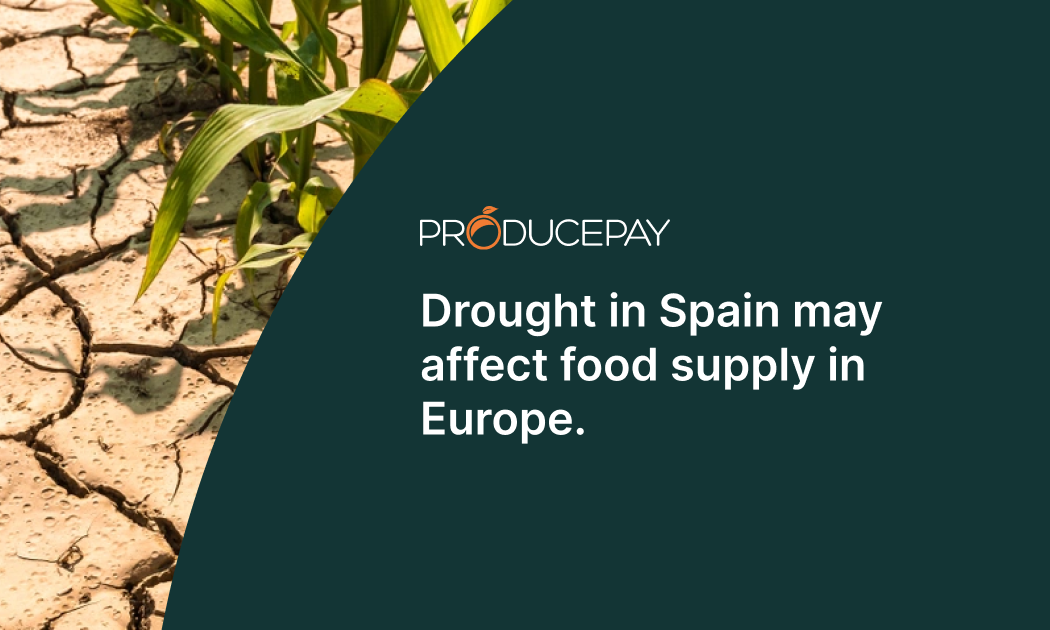
Drought in Spain may affect food supply in Europe.
A severe drought is damaging Spain’s agricultural sector. According to Farmers and Livestock Organizations Coordinator (COAG) reports, 60% of the countryside has been affected, and more than 3.5 million hectares of rainfed cereals have been lost.
The scarce rains and irrigation restrictions have also led to a decrease in fruit and vegetable production.
Spain exports a large volume of agricultural products to its European neighbors, so if the drought causes a significant decrease in Spanish agrarian production, this would affect the availability and prices of fresh produce in markets throughout Europe.
Additionally, a reduction in Spanish food exports would increase the demand for imports from non-European Union countries, such as Morrocco and some Latin American countries.
Drought has lowered farm production
Spain has experienced 21% less rainfall compared to the same period between 1991 to 2020. Additionally, reservoirs in Spain are at just over 40% of capacity, which is 20% below the last decade’s average.
The lack of water is so severe that some regions have stopped planting entirely, including Almeria and Andalusia, which is the country’s central agricultural region.
The provinces of Murcia, Valencia, Catalonia, southern Extremadura, Castilla-La Mancha, Aragon and the arid areas of Castile and Leon are also facing rainfall shortages and irrigation restrictions, which have negatively impacted crops and water availability for agriculture.
Which fruits and vegetables are most affected?
Water shortages have affected many fruit and vegetable crops, as irrigation restrictions have prevented the timely planting of some and reduced the yields of those undergoing vegetative development and harvesting.
The most affected open-air crops are leafy vegetables, carrots, onions, garlic, beets, stone fruit, melons, watermelon, potatoes, tomatoes for processing, avocados, custard apples and mangos.
The most affected greenhouse crops are bell peppers, tomatoes for fresh consumption, zucchini, eggplants, cucumbers, watermelon and melons.
Farmers are finding it increasingly difficult to maintain profitability as the lack of moisture drives down their production volumes.
What is the drought’s impact on Spain?
It’s too soon to understand the full repercussions of this extreme drought. If regular rainfall were to reappear soon, several farms could be saved, but if this situation continues for a few more weeks, the damage could grow considerably worse.
Some of the main consequences would be:
- Losses in agricultural production: The lack of water will decrease the production of fruits, vegetables, cereals and other agricultural products.
- Increased food prices: Decreased agricultural production could lead to higher food prices unless imports increase.
- Impact on the agricultural economy: Losses in production and higher costs could affect the profitability of farms, and some farmers could go out of business.
- Risks to agricultural employment: Spanish growers already struggle to attract workers and this situation could drive away needed laborers.
- Impact on the environment: Extreme drought increases soil degradation, reduces biodiversity and leads to the depletion of water resources by putting greater pressure on water bodies.
Given the disruptions in the agricultural supply chain on the European continent, it will be essential for growers and distributors to ensure its efficiency in the coming weeks.
Buyers, in turn, will have to provide sufficient volume to meet demand. It is also crucial for farmers to have a strong financial and liquidity position to meet potential challenges and commitments.
Sources: Revista Mercados, RTVE, La Razón
